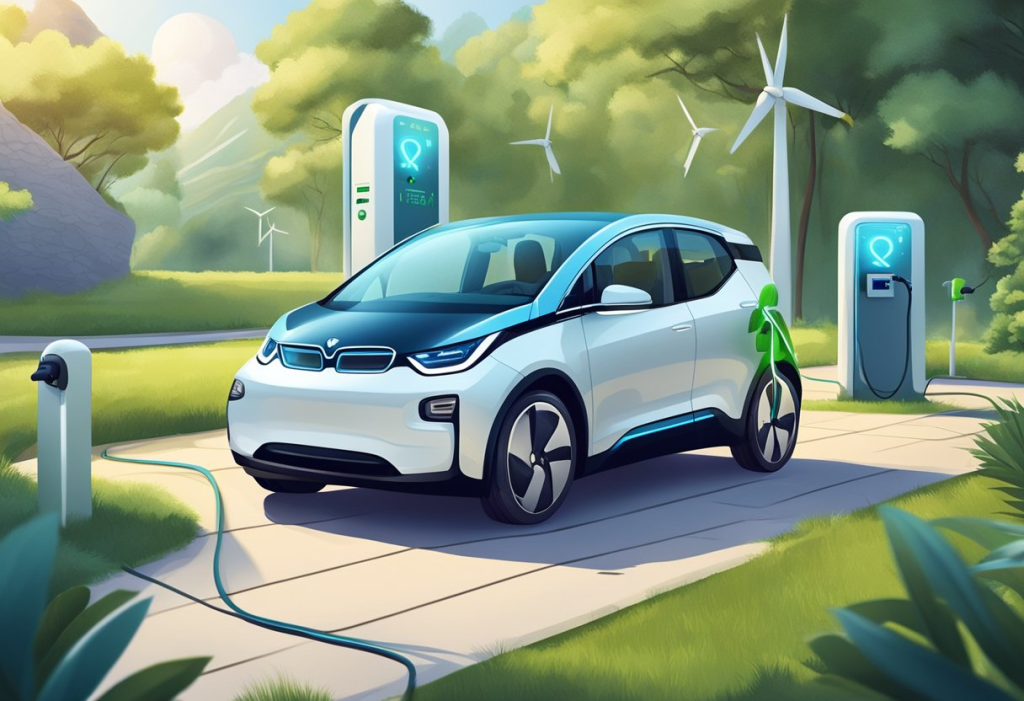Electric Cars for Beginners: A Friendly Guide to Eco-Friendly Driving
Electric cars have become increasingly popular in recent years due to their eco-friendliness and cost-effectiveness. For those who are new to the world of electric cars, it can be overwhelming to navigate the various models, charging options, and other factors to consider. This article aims to provide a beginner’s guide to electric cars, covering everything from the basics of how they work to tips for purchasing and maintaining an electric vehicle.

Electric cars, also known as electric vehicles (EVs), are powered by an electric motor instead of a traditional internal combustion engine. This means they don’t require gasoline and produce zero emissions, making them a more environmentally friendly alternative to traditional cars. While electric cars were once considered a luxury item, they have become more affordable in recent years and are now a viable option for many drivers. However, there are still some misconceptions surrounding electric cars that may deter some people from considering them. This article aims to dispel those myths and provide accurate information about electric cars for beginners.
Understanding Electric Cars
Electric cars are becoming increasingly popular as people look for more sustainable and eco-friendly alternatives to traditional gasoline-powered vehicles. However, for beginners, understanding the technology behind electric cars can be a bit overwhelming. In this section, we will cover the basics of electric cars, including how they work, battery technology, and charging basics.
Electric Motors and How They Work
Electric cars are powered by electric motors instead of internal combustion engines. These motors use electricity to generate torque and propel the vehicle forward. Unlike traditional engines, electric motors have fewer moving parts, making them more efficient and reliable.
Electric motors work by using magnetic fields to create motion. When electricity flows through a wire, it creates a magnetic field around the wire. The motor uses this magnetic field to create a rotational force, which is then used to turn the wheels of the car.
Battery Technology and Range
The battery is the most critical component of an electric car. It stores the energy needed to power the electric motor. Battery technology has come a long way in recent years, with lithium-ion batteries being the most common type of battery used in electric cars.
The range of an electric car refers to the distance it can travel on a single charge. The range varies depending on the battery capacity and driving conditions. Most electric cars have a range of 100-300 miles on a single charge, which is suitable for most daily commutes.
Charging Basics: Methods and Infrastructure
Charging an electric car is similar to charging a smartphone. There are two main types of charging: AC (alternating current) and DC (direct current). AC charging is slower but can be done at home using a standard wall outlet. DC charging is faster but requires special charging stations.
Charging infrastructure is still developing, but there are now thousands of charging stations across the country. Some electric cars can also be charged at home using a home charging station, which can be installed in a garage or driveway.
In conclusion, electric cars are an excellent alternative to traditional gasoline-powered vehicles. They are eco-friendly, efficient, and reliable. Understanding the basics of electric car technology, including electric motors, battery technology, and charging basics, is essential for beginners looking to make the switch to electric cars.
Benefits of Electric Vehicles
Electric vehicles (EVs) have become increasingly popular in recent years, and for good reason. In this section, we’ll explore some of the benefits of electric vehicles that make them a great choice for beginners.
Environmental Advantages
One of the most significant benefits of electric vehicles is their positive impact on the environment. EVs produce significantly fewer emissions than traditional gas-powered vehicles, which means they have a smaller carbon footprint. This is because EVs run on electricity, which is a cleaner and more efficient energy source than gasoline. Additionally, EVs don’t require oil changes, which means they produce less waste and pollution.
Cost Savings and Incentives
Electric vehicles can also save drivers money in the long run. While the upfront cost of an EV may be higher than a traditional gas-powered vehicle, the ongoing maintenance costs are typically lower. EVs require less maintenance overall, which means fewer trips to the mechanic and lower maintenance costs. Additionally, EVs are often eligible for federal tax credits, rebates, and state incentives, which can significantly reduce the overall cost of ownership.
Performance and Maintenance
Electric vehicles also offer a unique driving experience. EVs have instant torque, which means they can accelerate quickly and smoothly. Additionally, many EVs come equipped with a regenerative braking system, which captures energy that would otherwise be lost during braking and uses it to recharge the battery. This means that EVs are more efficient and require less energy to operate.
Overall, electric vehicles offer a range of benefits that make them a great choice for beginners. From their positive impact on the environment to their cost savings and unique driving experience, there are many reasons to consider an EV for your next vehicle.
Choosing Your Electric Vehicle
When it comes to choosing an electric vehicle, there are several factors to consider. From exploring different models and brands to understanding ownership costs and government incentives, it’s important to do your research before making a purchase.
Exploring Different Models and Brands
There are many different models and brands of electric vehicles on the market today. Some popular models include the Tesla Model 3, Nissan Leaf, Hyundai Kona Electric, Chevrolet Bolt, and Hyundai Ioniq 5. It’s important to consider your needs and preferences when choosing a model. Do you need a larger vehicle for your family, or are you looking for a smaller, more efficient option? Do you prefer a sedan or an SUV? Research the different options available to find the best fit for you.
Understanding Ownership Costs
While the upfront cost of an electric vehicle may be higher than a traditional gas-powered car, the cost of ownership can be significantly lower. Electric vehicles require less maintenance and have lower fuel costs. It’s important to factor in these long-term savings when considering the overall cost of ownership.
Navigating Government Incentives
There are several government incentives available for those who purchase electric vehicles. These include federal tax credits, rebates, and state incentives. It’s important to research the incentives available in your area to see how they can help offset the upfront cost of an electric vehicle. Keep in mind that these incentives may vary depending on the make and model of the vehicle.
By taking the time to explore different models and brands, understand ownership costs, and navigate government incentives, you can make an informed decision when choosing your electric vehicle.
Conclusion
In conclusion, electric cars are becoming more and more popular as people seek to reduce their carbon footprint and save money on fuel costs. While they may not be suitable for everyone, they offer a viable alternative to traditional gas-powered vehicles.
One of the main advantages of electric cars is their low maintenance costs. With fewer moving parts, there is less wear and tear, which means less money spent on repairs. Additionally, electric cars do not require oil changes or other routine maintenance that gas-powered cars do.
Another advantage of electric cars is their efficiency. Electric motors are more efficient than gas engines, which means they can travel further on a single charge. This makes them ideal for short trips around town or for commuting to work.
However, there are some drawbacks to electric cars as well. They can be more expensive to purchase than traditional cars, and the charging infrastructure is still developing in many areas. Additionally, some people may be hesitant to switch to electric because of concerns about range anxiety and the need to plan trips around charging stations.
Overall, electric cars are a promising technology that offer many benefits for those willing to make the switch. As the technology continues to develop and become more affordable, it is likely that we will see more and more electric cars on the road in the coming years.
Frequently Asked Questions
What are the top rated electric cars for new drivers?
The top-rated electric cars for new drivers include the Tesla Model 3, Nissan Leaf, Chevrolet Bolt, and Hyundai Kona Electric. These cars offer a good balance of range, affordability, and performance.
How can I find the best electric vehicle that fits my budget?
When searching for an electric vehicle that fits your budget, it’s important to consider the upfront cost, tax incentives, and ongoing maintenance expenses. Websites like Edmunds and Kelley Blue Book can help you compare prices and features of different electric vehicles.
What should I consider when choosing my first electric car?
When choosing your first electric car, you should consider factors such as range, charging time, and available charging infrastructure in your area. It’s also important to consider your daily driving habits and choose a car with a range that meets your needs.
Which upcoming electric vehicles should beginners keep an eye on?
Beginners should keep an eye on upcoming electric vehicles such as the Volkswagen ID.4, Ford Mustang Mach-E, and the Tesla Model Y. These cars offer impressive range and performance at an affordable price.
What are the benefits of owning an electric vehicle?
Owning an electric vehicle has several benefits, including lower fuel costs, reduced emissions, and a quieter driving experience. Electric vehicles also require less maintenance than traditional gas-powered cars.
How does maintenance for an electric car compare to a traditional vehicle?
Maintenance for an electric car is generally less expensive than a traditional vehicle. Electric cars have fewer moving parts, which means there are fewer components that can break down or require replacement. Additionally, electric cars do not require oil changes or other routine maintenance tasks associated with traditional gas-powered cars.

-

 Trânsito6 months ago
Trânsito6 months agoCNH Digital: Como Funciona e Quais os Benefícios para os Motoristas
-

 Trânsito6 months ago
Trânsito6 months agoCRLV Eletrônico: A Nova Era da Documentação Veicular
-

 Trânsito6 months ago
Trânsito6 months agoCadastro de Instrutor de Trânsito: Como Fazer a Inscrição ou Renovação
-

 Trânsito6 months ago
Trânsito6 months agoCarteira de Motorista na Palma da Mão: O Guia Completo da CNH Digital
-

 Trânsito6 months ago
Trânsito6 months agoO Guia Completo da CNH Digital: Como Obter e Utilizar
-

 Trânsito6 months ago
Trânsito6 months agoAplicativo CNH Digital: Facilidade e Praticidade na Gestão da Sua Habilitação
-

 Trânsito6 months ago
Trânsito6 months agoCRLV Digital: Descomplicando a Documentação dos Veículos
-

 Trânsito6 months ago
Trânsito6 months agoTransformando o Trânsito: A Era da Carteira Digital de Trânsito